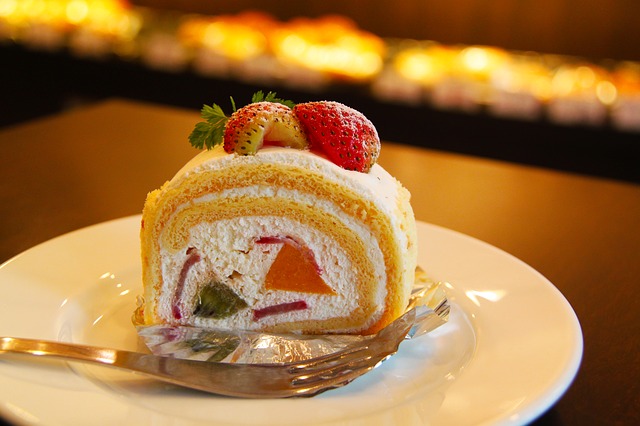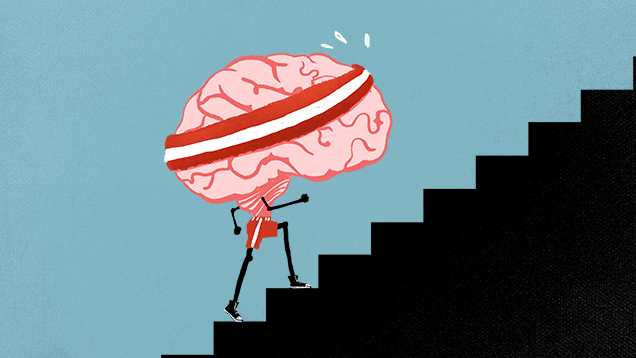You can have all the good intentions in the world, but they’re only as good as your self-control. Here’s what you need to know about the neuroscience of willpower — and what you can do to make your will even stronger.
Illustration by Tara Jacoby
Willpower, or self-control, is defined as the exertion of control over the self by the self. It occurs when a person tries to change the way they would otherwise think, feel or behave. Ideally, these behaviours are intended to maximise or enhance our best interests. It’s also powerfully adaptive.
When we exercise self-control, we delay gratification and resist temptation in the here-and-now to avoid self-destructive behaviours. So, by holding off on that cheesecake, or by putting a few extra dollars into your savings account instead of making an impulse purchase, you’re exerting self-control. And you’re making your life better or more healthy in the long term.
A Limited Resource
Before we talk about the various ways to boost our willpower, it’s important to know how and why it becomes diminished. The general consensus is that the brain can only handle a limited amount of self-regulation before other areas of focus start to slip. As the seminal work of Florida State University psychologist Roy Baumeister has shown, it’s basically a limited resource; like fuel, it gets used up when we control our thoughts, impulses or feelings, or when we change our behaviour in pursuit of goals.

Cookies or radishes? The choice to resist taxes our willpower. Image: Pixabay/CC
Studies show that when we successfully accomplish one task that requires determined focus, we become less persistent on a second unrelated task. In an interesting experiment, hungry participants were asked to eat radishes while others were given aromatic chocolate chip cookies. Afterwards, those who were asked to eat the radishes — that is, those who had to exert willpower — gave up on a complicated puzzle far earlier than the others, working less than half as long.
A follow-up study by Baumeister’s protégé, Jean Twenge, yielded similar results. He had participants decide which of several products (pens or candles, black or red t-shirts) they’d prefer to receive. Following that exercise, their willpower was tested by having them hold their hand in an ice-water bath. Compared to participants who merely gave their opinion of the same products and reported how often they had used those items in the past month, those who had to choose which item they desired had a much-diminished ability to hold their hands under water.
Part of the problem is that willpower requires a relentless and seemingly endless stream of decision-making. This results in “decision fatigue”, a phenomenon that works to diminish self-control.
Back in 2000, a study considered how the number of choices might influence purchasing behaviour of a variety of jams. When participants encountered a booth with 24 jams, as opposed to just six, they were more likely to stop to try the jams. However, in both cases, participants ended up sampling between one and two jams, on average — and moreover, people who stopped at the limited choice booth were much more likely to actually buy jam than people who stopped at the extensive choice booth. The study suggests that people don’t do well when they’re presented with too many choices; it’s simply too exhausting, and it wears down our ability to exert power over our behaviour.
Conversely, a recent study found that a strong belief in free will can make decision-making more enjoyable, and can increase our satisfaction with choices after we’ve made them. It can even make us more productive.
Also, watching reruns can actually help us restore willpower. A SUNY Buffalo study showed that familiar shows serve as a form of “social surrogacy”. Previous work has suggested that positive social interactions can restore depleted willpower. And because reruns are predictable (and not fraught with the stress of negative social interactions), they can actually provide beneficial effects to not just self-control, but to concentration and mood as well.
In light of this, Baumeister coined the term “ego depletion”. The ego, he says, has a finite capacity to control the id and superego, which is something Freud talked about a century ago.
Writing in the New York Times, John Tierney puts it well when he says:
These experiments demonstrated that there is a finite store of mental energy for exerting self-control. When people fended off the temptation to scarf down M&M’s or freshly baked chocolate-chip cookies, they were then less able to resist other temptations. When they forced themselves to remain stoic during a tearjerker movie, afterward they gave up more quickly on lab tasks requiring self-discipline, like working on a geometry puzzle or squeezing a hand-grip exerciser. Willpower turned out to be more than a folk concept or a metaphor. It really was a form of mental energy that could be exhausted.
These experiments appear to confirm the 19th century notion that willpower is like a muscle that fatigues with overuse, but one that can be conserved by avoiding temptation.
Your Ego Is What You Eat
Interestingly, self-control has also been linked to diet, which is interesting when you consider the common complaint made by many people about how they lack the willpower to resist overeating.

Image: Pixabay/CC
Back in 2011, an Israeli study looked at 1112 judicial rulings made over 50 days in a 10-month period by eight judges regarding whether to grant prisoners parole. Revealingly — if not disturbingly — judges were far more likely to grant parole early in the day, right after eating a meal, versus later in the day, a few hours after their last meal.
This work fits in remarkably well with other studies showing that decision fatigue might be attributable to a depletion of glucose in the brain — a finding that squares very well with dieters’ struggles to not binge eat when food-deprived. Indeed, M.T. Galliot has shown that self-control relies on glucose as a limited energy source, and that “willpower is more than a metaphor”.
Willpower, says Stanford psychologist Kelly McGonigal, is similar to stress, but acts in a distinct way. It calms the body down to focus on intentional decision-making, and sends extra energy to the prefrontal cortex. The brain, she says, enters into two modes: the impulsive self and expansive self. McGonigal recommends focusing on something (to achieve flow) to distance ourselves from negative thinking. At the same time, mind-wandering is detrimental (which may be analogous to having too many choices). Willpower can thus be thought of as a muscle, albeit a metaphorical one; practising can make it easier, as can meditation and physical exercise.
Indeed, as Robert Sapolsky points out in a Wall Street Journal article, the brain requires boat loads of energy. At rest it sucks up about 25 per cent of our circulating glucose, despite comprising only 3 per cent of our body weight. When the “cognitive load” is increased in our prefrontal cortex, we exhibit less self-control on subsequent tasks; our circulating glucose levels plummet. At the same time, however, our self-control improves if we sip sugary drinks during the task. Sapolsky points to the recent work of Ohio State University psychologist Brad Bushman:
Volunteer married couples had their blood sugar levels monitored daily for weeks. Each evening participants rated the level of any anger they were feeling toward their spouse. Subjects indicated their level of anger through the number of pins they’d put into a voodoo doll representing their spouse. The unorthodox measurement technique showed that when blood glucose levels were lower, people tended to stick in more pins.
Does this relationship between glucose levels and aggressive impulses translate into person-to-person behaviour as well? Couples, seated in different rooms, next played a competitive computer game that ended with the loser getting a blast of unpleasant noise. Participants would decide how loud a noise their spouse would be pummelled with — up to 105 decibels. Once again, the lower the glucose levels, the louder and longer the noise inflicted on loved ones.
These results appear to demonstrate the effects of low blood glucose on willpower and judgment.
Work by Todd Heatherton has shown the neurological effects of ego depletion. Looking at brain scans, he showed that self-control causes the brain’s nucleus accumbens — the brain’s reward centre — to light up, along with a corresponding decrease in activity in the amygdala, the part of the brain that helps us control impulses. Caltech neuroscientist Antonio Rangel has used fMRIs to highlight the areas of the brain responsible for decision making; his team found that the ventromedial prefrontal cortex (bottom, middle PFC) encodes the value of objects, like the tastiness of a piece of cake. The dorsolateral PFC (top and side) houses self-control centres. His team also discovered that people exhibiting higher self-control in a task also had more activation of DLPFC.
Revealingly, Heatherton also showed that the delivery of glucose reverses brain changes caused by depletion. As summarised by Tierny:
Apparently ego depletion causes activity to rise in some parts of the brain and to decline in others. Your brain does not stop working when glucose is low. It stops doing some things and starts doing others. It responds more strongly to immediate rewards and pays less attention to long-term prospects.
So, in order not to eat, a dieter needs willpower. But in order to have willpower, a dieter needs to eat. Moreover, our stimulation-filled modern lives may be inflicting us with ego depletion and decision fatigue at rates far higher than what our palaeolithic ancestors had to deal with; we’re not evolutionarily primed for this bombardment. As Baumeister has said, “The best decision makers are the ones who know when not to trust themselves.” Thus, a good idea is to to be aware of decision fatigue and divert our thoughts to something else if we hope to succeed in resisting temptation.
All this said, not everyone buys into the glucose hypothesis. Writing in his blog, psychologist Robert Kurzban says that the amount of glucose in the bloodstream is not directly associated with the amount of glucose in the brain and that this is all a relic of the ideas of the 19th and early 20th century regarding the mind. He quotes Van den Berg from a 1986 paper:
Descriptions of behavioural acts or activities using a terminology in which concepts like energy play a major role are very likely based on a false analogy. The assumption that the brain is a machine like the muscles, albeit more complex, is ill-founded. Once we have developed a theory of the dynamics of behaviour in which no traces remain of nineteenth century conceptual frameworks of energetics many of our current problems will vanish. We will not then be misled by the term mental energy, nor will we advise someone to take sugar when he or she complains of being tired after writing a paper!
Subsequently, Kurzban argues that the “right answer to the question about why exerting willpower is hard is not going to be packets of sugar”.
Consistent Throughout Life
The neurological basis of willpower is further enforced by a long-term study adopted by Cornell University psychobiologist B. J. Casey. His work is a continuation of a Stanford experiment conducted back in the 1960s when psychologists (very famously) subjected four-year-old children to a very demanding test. The kids were placed in a small room with a marshmallow and were told they could either eat the treat immediately, or they could have a second one if they waited 15 minutes until the researcher returned. Most children waited, but some failed to make it all the way through the entire 15 excruciating minutes.
Here’s a recent reprisal of the experiment:
Fascinatingly, follow-up studies showed that the so-called “high delayers” (that is, those who exerted more self-control) were less likely to have behavioural problems and addiction and weight issues later in life as compared to “low delayers” (that is, the kids who ate the treats in less than a minute). Not only that, high-delayers scored an average of 210 points higher on their SATs.
Recent work by Casey on the same group of individuals 40 years later is offering even more insight. His work shows that our willpower is consistent throughout our entire lives. Self-control tests both with and without emotional “hot cues” showed that, “Individuals who were less able to delay gratification in preschool and consistently showed low self-control abilities in their twenties and thirties performed more poorly than did high delayers when having to suppress a response…”
As summarised by Maia Szalavitz in TIME, after performing brain scans on the 26 participants, the researchers found that
high delayers showed more activity than low delayers in a region of the prefrontal cortex associated with impulse and behaviour control, particularly while completing the task involving emotionally charged expressions. Meanwhile, low delayers showed more activation of a deeper region of the brain associated with pleasure, desire and addiction, especially in response to the happy faces.
You might say that high delayers have better mental brakes, while low delayers are driven by a stronger engine. “The low delayers don’t tend to activate the prefrontal cortex as much as the high delayers do. The high delayers are very effective at being able to regulate their behaviour and not activating this deep system,” Casey says. “There’s not as much of a push-and-pull for the high delayers.”
Importantly, low delayers don’t lack general intelligence. And in fact, they have traits that are deemed important to society. “In uncertain times,” says Szalavitz, “delaying gratification can be the wrong choice, and people who follow their emotional impulses can become great explorers or entrepreneurs.” At the same time, however, and as illustrated by the long-term ‘marshmallow’ study, low delayers can also get into serious trouble.
Quick Tips
To summarise, here are some things you can do to boost your willpower:
- Simply be aware that you’re using your willpower on an ongoing basis and that you’re being confronted with a steady stream of decision-making
- Because decision-making is fatiguing, your ability to make good decisions will be compromised by (1) an excess of choices and (2) low energy (that is, low glucose) levels; thus, try to limit the number of choices whenever possible, reduce the number of “critical” decisions you have to make on a daily basis, and boost your brain with a sugary drink (you don’t even have to swallow the drink — just swish it around and spit it out)
- Focus on a singular task or problem to achieve “flow” and avoid negative thinking
- Avoid mind-wandering
- Divert your thoughts away from potential temptations
- Accept that you have more free will than you think
- When facing a task that requires lots of self-control, you’ll have more willpower if you choose to re-watch shows/films or re-read familiar books
- Meditate and do physical exercise
- Strengthen your willpower as if it were a muscle (for example, brush your teeth wrong-handed)
Additional reporting by Levi Gadye.
Other sources: American Psychological Association | New York Times | Slate | Time

Comments